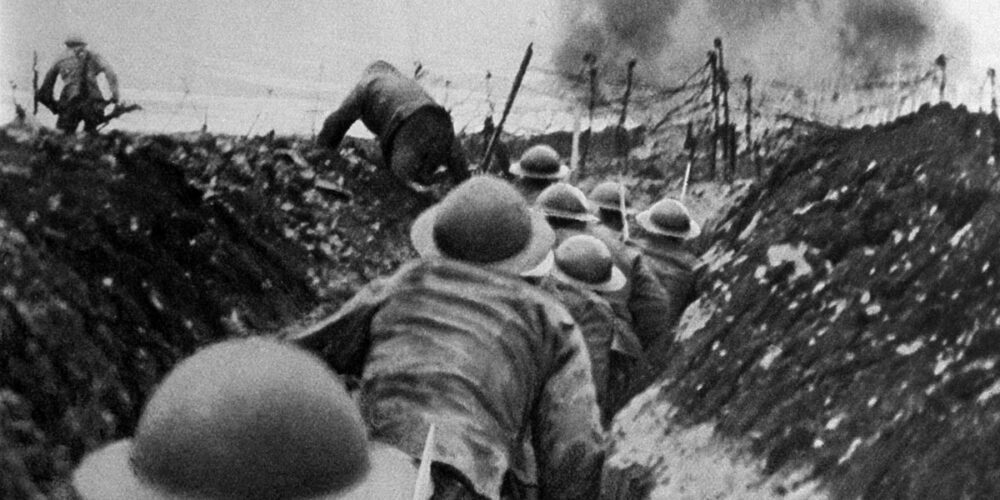■ Erich Maria Remarque, All Quiet on the Western Front (1928)
The First World War was described as “the war that will end war,” so great was the horror of this new, diabolical stage of industrial annihilation. We know today that, without seriously addressing the causes of war, or the greed for new markets and spheres of power, wars will continue, no matter what. However, the Great War gave birth to an anti-war literature hitherto unknown.
Mainstream cultural life in the twenty-first century largely ignores wars, nor has it embraced twentieth-century anti-war cultural heritage. Yet anybody who reads the novels and poetry, listens to the music, watches the plays, looks at the paintings or hears the songs of those who lived through the horrors of the First and Second World Wars cannot fail to be profoundly shocked and motivated to really put an end to war. Perhaps that is why these works of art are as good as absent from mainstream culture.
All Quiet on the Western Front by Erich Maria Remarque is arguably the most famous anti-war novel of all time. Published in 1928, it was one of the greatest book successes of the first half of the twentieth century. The picture it paints, the inhuman reality of war, reflected the experiences of millions of soldiers.
At the heart of the story is a group of young soldiers who go from school straight onto the battlefield. Their dehumanising by adapting to industrialised slaughter becomes the turning-point in their lives. They ask questions about who is responsible for the war, but have no answers. While the novel never reveals the imperialist interests of the world war, it nevertheless condemns the powers that criminally abused Remarque’s generation. What holds them together is their camaraderie, a humanity they preserve.
Ten years after the publication of this novel the idea of camaraderie was to be exploited by the German fascists for their new war plans. However, in Remarque’s book this comradeship has nothing to do with “leader” and “followers” in aggressive militarist interest. Rather, it is a sense of solidarity among those who need to support each other, and this extends to the soldiers in the “enemy” trench. They understand instinctively that the enemy is a victim of the same powers as they are.
In a memorable scene, the central character is caught in a shell hole along with the French soldier he has just killed. He asks, “Why do they never tell us that you are poor devils like us, that your mothers are just as anxious as ours, and that we have the same fear of death, and the same dying and the same agony—Forgive me, comrade, how could you be my enemy?”
Remarque’s unvarnished portrayal of the war hit a nerve with the public. It became an immediate best-seller in Germany and internationally. In the 1920s it was translated into twenty-six languages; today there are editions in fifty languages, with an estimated circulation of between 20 and 40 million copies. The title has become synonymous with the senselessness of war, the senseless of ordinary people dying in the interests of profit and power.
Remarque was born into a Catholic working-class family in Osnabrück in June 1898. When world war broke out in 1914 he was sixteen. Like so many, he fell victim to the jingoist propaganda and joined the Youth Corps, a militaristic cadet organisation. Aged eighteen in November 1916, he was conscripted. Shortly after seeing action on the western front he was wounded in July 1917 and spent more than a year recovering and was not sent back to the front.
In May 1933 Remarque left Germany for Switzerland, having had to flee overnight after being warned by a friend that he was in danger. His German citizenship was revoked, and he never returned to live in Germany. He left Switzerland for the United States on the eve of the Second World War and became a naturalised US citizen in 1947.
In 1943 the Nazis arrested Remarque’s youngest sister, Elfriede Scholz. She and her husband had stayed in Germany with their two children. She was found guilty of “unpatriotic” views and was beheaded on 16 December 1943. Remarque only discovered what happened to her after the war, and dedicated his novel The Spark of Life (1952) to her. German publishers omitted the dedication, as Remarque was still considered a traitor by many Germans. Although he was repatriated as a German citizen after the war, he remained isolated from German cultural life and died in Switzerland fifty years ago, on 25 September 1970.
All Quiet on the Western Front has lost none of its power. It is an outstandingly sensitive depiction of the effect that murderous warfare has on the human psyche. We still need books like this.






